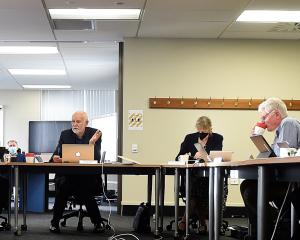The pay figures of University of Otago and Southern District Health Board staff published by this newspaper last weekend provide good news for the city, particularly given the recent focus on job losses, restructuring and the resulting uncertainty.
The university figures showed, of its approximately 3755 staff, 634 earned more than $100,000 in the 2012-13 financial year.
(Of those, 143 earned between $150,000 and $199,999, 20 between $200,000 and $299,999 and one more than $400,000 - likely vice-chancellor Prof Harlene Hayne, who, according to the State Services Commission, earned $520,000 to $529,999 in 2012-13.)
The health board figures showed, of its 4500 staff members (full- and part-time), 496 earned more than $100,000 in 2012-13.
(The top earner got between $510,000 and $520,000. Chief executive Carole Heatly's remuneration package was $430,000 to $440,000. If part-time salaries were rounded to full-time, the number paid more than $100,000 would swell to 692.)
The figures clearly demonstrate the importance of the health and education sectors to the city and, given they are the city's largest employers and include large numbers of senior positions, are probably unsurprising.
But it is also heartening to note, according to this year's census, they only comprise a third of the 3702 people living in Dunedin who earn more than $100,000 a year.
Many of those will be local and central government positions, but there are clearly also a significant number - and range - of private sector professional jobs pushing up the figures - in the legal, finance, farming-related, science and technology sectors, which is reassuring for long-term growth and security.
Given the stratification of salaries in modern business, the numbers in the higher salary bands would be much higher had Dunedin been able to retain its head office role for many companies, the likes of Fulton Hogan or Ravensdown in relatively recent years, with a string of others from earlier decades.
The numbers of company executives in Auckland and Christchurch provide a broad band of wealth and economic impetus for those cities.
This is all the more reason for Dunedin to treasure those companies - large (like Silver Fern Farms) or small - that still operate nationally and internationally from out of the city.
While it may seem to some the numbers of top earners even in Dunedin are high, and indeed some lower-wage earners may even begrudge those receiving high salaries, the fact is, the top earners still comprise only a small percentage of our population, many of them still earn less than they might in other comparable cities or countries, and they are vital to further enhance our reputation, to build on our knowledge economy, encourage spending, and allow us to grow services and infrastructure.
To do that we also have to acknowledge we live and work in a global marketplace.
While many people undoubtedly choose Dunedin for its charm, its lifestyle opportunities, collegiality, its relative ease of living, and cost of living in certain areas such as housing, our pay rates increasingly need to be attractive and competitive in an international market.
Some living expenses, such as food, clothing and entertainment are the same as other larger cities.
We have to ensure skilled workers receive a return on their educational investment and are well remunerated for their abilities.
And we must also work to ensure skilled workers are attracted across a range of sectors - business, manufacturing, technology, hospitality and tourism, health and education, arts and culture, science and innovation - if we want to maintain a well-balanced society.
As some critics note and fear an increased push towards centralisation, our small to medium-sized businesses will be as pivotal to our growth and stability as our major players.
The challenge for businesses, the chamber of commerce and the council is to turn the aspirations of the economic development strategy into reality, to ensure we not only train and educate our future leaders, but that we retain and nurture them, that they can share their skills, spend their wealth here, and teach and employ others who will do the same.











